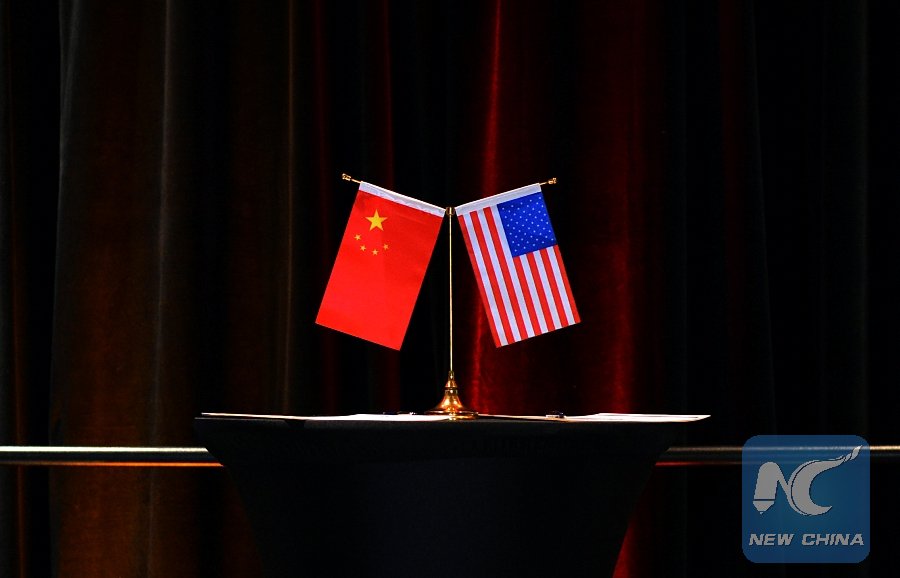


Photo shows Chinese and U.S. national flags. (Xinhua)
WASHINGTON, Feb. 18 (Xinhua) -- American businesses would be significantly impacted with hundreds of billions losses in foregone GDP and capital gains and U.S. productivity and innovation undermined if the United States and China were to fully decouple, a new report showed Wednesday.
The United States would forgo 190 billion dollars in gross domestic product (GDP) annually by 2025, if 25-percent tariffs were expanded to cover all two-way trade, according to the analysis by U.S. Chamber of Commerce's China Center in partnership with Rhodium Group.
If decoupling leads to the sale of half of the U.S. foreign direct investment (FDI) stock in China, U.S. investors will lose 25 billion dollars per year in capital gains, and models point to one-time GDP losses of up to 500 billion dollars, showed the report titled "Understanding U.S.-China Decoupling: Macro Trends and Industry Impacts."
The report identified the potential costs of a U.S.-China decoupling from two perspectives: the aggregate costs for the U.S. economy across trade, investment, people, and ideas, and the industry-level costs in civil aviation, semiconductors, chemicals, and medical devices.
"If we were to try to cut off everything or the preponderance of our economic engagement with China would be so expensive that it would make everyone, even the most hawkish Americans and national security professionals, very uncomfortable," said Daniel Rosen, founding partner of Rhodium Group, at a virtual release event for the report.
On industry-level costs, full decoupling would lead to tremendous U.S. output losses for strategic U.S. industries, weakening their ability to sustain jobs, research & development (R&D), and global technology leadership, the report said.
Among the industrial losses it listed, the U.S. aircraft and commercial aviation services would suffer output losses ranging from 38 billion to 51 billion dollars, plus job losses between 167,000 and 225,000.
For the U.S. semiconductor industry, a loss of access to Chinese customers would cause 54 billion to 124 billion dollars in lost U.S. output, risking more than 100,000 U.S. jobs, and 12 billion dollars in R&D spending.
"We did this study largely to suggest that the degree of interconnectedness between the United States and China creates a very complex relationship, such that efforts from the United States or China to decouple, to disengage actually, have perhaps unintended consequences," said Charles Freeman, senior vice president for Asia at the U.S. Chamber of Commerce.
Freeman said it requires "surgical efforts" to preserve U.S. interests when dealing with China, urging policymakers in Washington to avoid "sledgehammers" in China policies.
 Fire brigade in Shanghai holds group wedding
Fire brigade in Shanghai holds group wedding Tourists enjoy ice sculptures in Datan Town, north China
Tourists enjoy ice sculptures in Datan Town, north China Sunset scenery of Dayan Pagoda in Xi'an
Sunset scenery of Dayan Pagoda in Xi'an Tourists have fun at scenic spot in Nanlong Town, NW China
Tourists have fun at scenic spot in Nanlong Town, NW China Harbin attracts tourists by making best use of ice in winter
Harbin attracts tourists by making best use of ice in winter In pics: FIS Alpine Ski Women's World Cup Slalom
In pics: FIS Alpine Ski Women's World Cup Slalom Black-necked cranes rest at reservoir in Lhunzhub County, Lhasa
Black-necked cranes rest at reservoir in Lhunzhub County, Lhasa China's FAST telescope will be available to foreign scientists in April
China's FAST telescope will be available to foreign scientists in April "She power" plays indispensable role in poverty alleviation
"She power" plays indispensable role in poverty alleviation Top 10 world news events of People's Daily in 2020
Top 10 world news events of People's Daily in 2020 Top 10 China news events of People's Daily in 2020
Top 10 China news events of People's Daily in 2020 Top 10 media buzzwords of 2020
Top 10 media buzzwords of 2020 Year-ender:10 major tourism stories of 2020
Year-ender:10 major tourism stories of 2020 No interference in Venezuelan issues
No interference in Venezuelan issues
 Biz prepares for trade spat
Biz prepares for trade spat
 Broadcasting Continent
Broadcasting Continent Australia wins Chinese CEOs as US loses
Australia wins Chinese CEOs as US loses